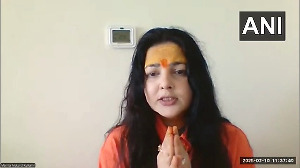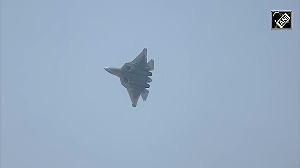
Jyotindra Nath Dixit's appointment as National Security Adviser and Brajesh Mishra's successor is not a surprise. For over a year now, he has been closely associated with the Congress party's foreign affairs cell and played an active role in the drafting of the party's pre-poll paper on foreign policy, defence and national security.
Also Read: Revamping National Security
Unlike Mishra, who never rose to be the foreign secretary due to his premature retirement from the Indian Foreign Service in the early 1980s reportedly after differences with Indira Gandhi, Dixit rose to be foreign secretary, after having distinguished himself as head of the Indian diplomatic missions in Pakistan and Sri Lanka. He served during difficult times in India's relations with these countries.
J N Dixit in the Rediff Archives: 'By the end of 1986, Prabhakaran was disillusioned with his Indian connection'
Amongst those, who had served as foreign secretaries, no other officer has the kind of experience and expertise in matters relating to South Asia as Dixit has, not only in Pakistan and Sri Lanka, but also in Bangladesh and Afghanistan.
During his career in those countries, Dixit, an extremely active, articulate, outgoing and social officer, built up a network of friendships at the political, bureaucratic and non-governmental levels, which he has sustained even after his retirement in 1993.
J N Dixit in the Rediff Archives: 'The intelligence agencies said, Don't worry about the LTTE, they are our boys, they will not fight us'
Next to K Subramanhyam, the doyen of India's community of strategic analysts, Dixit is widely accepted as a leading thinker in matters concerning national security and has been a prolific writer and speaker on this subject since his retirement.
J N Dixit in the Rediff Archives: 'Sri Lanka continues as a united country because of Rajiv Gandhi'
As the NSA, he would be the principal adviser to the prime minister on all matters concerning national security -- internal or external. Though his expertise in internal security management is not comparable to his in external security, it is much more than that of Brajesh Mishra, who had no exposure to internal security management till he joined Prime Minister Vajpayee's office as the principal secretary in 1998. Moreover, even during his five years as the principal secretary to the prime minister and the NSA, Mishra's exposure to internal security problems remained limited due to two reasons.
First, L K Advani as the home minister and subsequently also as the deputy prime minister, kept the home ministry and the Intelligence Bureau tightly under his control and sought to keep Mishra out of internal security management as far as possible. Second, Mishra could never succeed in building a network of contacts and friendships amongst bureaucrats outside the IFS, either in the Centre or in the states. Consequently, he remained rather ill-informed about the goings-on in different states.
This is possibly one of the reasons why Vajpayee remained oblivious of the rumblings against the BJP-led government in different states. Traditionally, it has always been the principal secretary to the PM who has felt the pulse of different states and kept the prime minister alerted to worrisome developments.
J N Dixit in the Rediff Archives: 'By its tests, Pakistan has certainly achieved a certain macro level parity with India'
Having served in Bangladesh, Pakistan and Sri Lanka, Dixit has a better understanding of internal security problems than Mishra since developments in these countries have always had a significant impact on our internal security. He is quite knowledgeable on the LTTE and on the various Pakistan-based terrorist organisations active in Jammu and Kashmir and knows more about the functioning of Pakistan's Inter-Services Intelligence than many IFS officers.
Moreover because of his long tenure in the difficult states bordering India and his outgoing nature, he has a large network of friends and contacts in different state administrations and in the Indian intelligence community. After his retirement, he has been travelling frequently inside India, interacting with them and thereby kept himself well-informed.
Amongst the factors which could initially create some problems for him are, firstly, his image in many countries, particularly in South Asia, as a hardliner in matters involving India's national interests who believes in a policy of carrot and stick, as a man who does not hesitate to wield the stick if considered necessary and who likes to call a spade a spade and, secondly, the dependence of the Congress on the Communists for its survival in power, which could act as a drag on national security management.
The BJP-led coalition had a certain coherence in matters involving national security and foreign policies and, hence, Mishra did not face this difficulty.
In his pre-poll statements, Dixit indicated that if the Congress came to power, it would retain the national security management infrastructure created by the previous government, and make it function effectively instead of remaining moribund as it was (according to him) in the Vajpayee administration.
If the new government retains the infrastructure, Dixit will act as the supervisor of the National Security Council Secretariat and as the interface between the NSCS on the one side and the National Security Council and the Strategic Policy Group on the other and between the SPG on the one side and the NSC and the Cabinet Committee on Security on the other.
The NSC is a high-power policy-making body chaired by the prime minister and consisting of his principal ministers dealing with national security.
The SPG is a high-powered policy-recommending body chaired by the Cabinet secretary and consisting of the secretaries in charge of departments dealing with national security and the chiefs of the armed forces and the intelligence agencies.
Dixit will also guide the work of the non-governmental National Security Advisory Board and make its inputs available to the NSC after having been vetted by the SPG.
J N Dixit in the Rediff Archives: Indo-US Relations: Delhi dialogue and after
One of the reasons why Mishra strongly opposed the appointment of a separate national security adviser in the Prime Minister's Office was his fear that this could create two conflicting centres of advice and power in the PMO, adding to the already existing confusion in national security management. It was said that he wanted all advice on national security to go to the PM from his office, whether he was called the principal secretary or the NSA. He did not want two parallel offices advising the PM, one not knowing what the other was advising.
Till Vajpayee became prime minister in 1998, the Research and Analysis Wing, the external intelligence agency, functioned directly under previous prime ministers in all operational matters and under the Cabinet secretary in all administrative matters. Previous principal secretaries used to have very little role in supervising RAW's functioning. Vajpayee delegated the responsibility for the operational supervision of RAW to Mishra.
In matters relating to intelligence policy management, Mishra played a much larger role than any of his predecessors as principal secretary. In the US, the NSA is the adviser to the president on national security management, but has no role in intelligence management. The director of the Central Intelligence Agency, in his additional role as director, central intelligence, acts as the adviser to the president on intelligence management.
Mishra performed four roles -- as principal secretary to the PM, as the NSA, as the adviser on intelligence policy management and as chairman of the co-ordinating committee set up in 2001 to co-ordinate the functioning of the intelligence agencies. The last role was entrusted to him on the recommendation of the Special Task Force on the revamping of the intelligence apparatus headed by Girish Chandra 'Gary' Saxena, former head of RAW and governor of Jammu and Kashmir.
For performing his role as the principal secretary, Mishra depended on the PMO and for performing the other three roles, he depended on the NSCS. Now that the government seems to have decided to appoint a separate NSA, certain questions may have to be addressed in the days to come: What will be the respective roles of the principal secretary and the NSA in matters concerning the formulation of national security policies and their implementation? Would the NSA also be responsible for intelligence policy management and intelligence activities co-ordination? If not, who would perform this role? If it is decided that this role would be performed by someone other than the NSA, what would happen to the role of the NSCS in this matter?
Photograph: RAVEENDRAN/AFP/Getty Images
Image: Uday Kuckian






 © 2025
© 2025